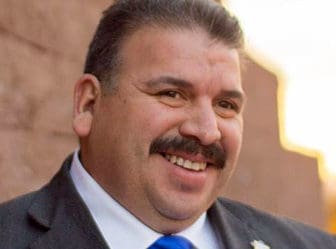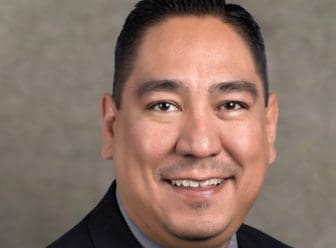
Heath Haussamen / NMPolitics.net
A statue outside the Roundhouse in Santa Fe.
Angelica Rubio says state legislators should be paid a salary that matches New Mexico’s median household income.
Ray Jaramillo supports paying lawmakers a “small but fair” salary, at least while they’re in session in Santa Fe for 30 days one year and 60 days the next.
Paul “Pablo” Martinez points to the state’s economic struggles to say now isn’t the time to pay New Mexico’s state legislators – the only in America who receive no salary.
But Jaramillo and Rubio say paying legislators would increase participation and create a more well-rounded policymaking body that could help improve the state.
The three Democrats are battling for their party’s nomination for the Las Cruces-area District 35 seat in the N.M. House of Representatives. The candidates’ differing opinions present a real contrast and represent viewpoints often expressed in the debate over whether New Mexicans should pay our legislators for their work.
A growing number of people, myself included, have come to believe the structure of our part-time, unpaid state Legislature – which affects the Legislature’s capacity, expectations, and ethics – is one of the biggest challenges to improving our state. With that in mind, NMPolitics.net asked questions of every state legislative candidate who has a primary race – several dozen in total – about improving the Legislature’s structure. They were given no word minimum or limit for responses.
Some candidates didn’t fill out our questionnaire, but many did. We’ll be reporting on responses from candidates in other races in the coming days.
Martinez, Jaramillo and Rubio are in a hotly contested battle to replace Jeff Steinborn, who’s giving up the House seat to run for a state Senate seat. Early voting in the June 7 Democratic and Republican primaries is already underway.
The winner of the House District 35 Democratic primary will face Republican Joseph Bishop in November.
Here’s more about the District 35 Democratic primary candidates:
Paying lawmakers
Given that New Mexico’s legislators aren’t paid – and many struggle to balance their unpaid service with jobs, families and other duties – we asked the candidates to share how they will balance legislative service with other aspects of their lives to be effective policymakers. Their responses shed light on their views on legislative pay.

Courtesy photo
Paul “Pablo” Martinez
Martinez, a retired corrections administrator, said his children will soon take over the private investigations business he runs. He said he wanted to help his children through college before running for office.
“Now that my family is grown up and on their own as young adults, I am able to provide this extra time to public service and give back to society as a lawmaker,” Martinez said.
There are many retirees in the Legislature. One of the criticisms of New Mexico’s unpaid system is that it makes it difficult for younger and mid-career people to participate because of the personal sacrifices they would have to make. Jaramillo and Rubio fit into this category.
Jaramillo, the director of Alpha School, a Las Cruces preschool, said he sees legislative service “as a privilege” – and his family “is completely in support of my goals and we all recognize that being a legislator sometimes means sacrificing time together for the greater good.”
“They have been and will continue to be a support system, source of information, inspiration, and the reason why I want to help make New Mexico a better place for everyone,” Jaramillo said. “In short, this job will require balance. But, I will adopt my responsibilities and privilege as part of my daily life knowing that every opportunity to participate, listen, learn, and teach, will make me the best representative I can be.”

Courtesy photo
Ray Jaramillo
Rubio, who has worked as a community organizer, freelance writer and nonprofit consultant, said she’s never worked a 9-5 schedule or made lots of money, which has forced her to develop discipline and agility that will help her serve in the Legislature. But she said the current system isn’t sustainable.
“It is unclear whether this system of not paying our legislators has a direct correlation with the dismal rankings the state faces, but it is clear that if we are to make strides to improve our situation, the Legislature should not only work for New Mexicans during a 30- and 60-day session, but everyday – providing constituent services, among other services, which may not be feasible in our current state,” she said.
Martinez, on the other hand, said it’s because of the need to fund “programs that benefit children and families” that now isn’t the time to consider paying lawmakers.
“We need to fund and solve our budget crisis and shortfalls first, before we can even consider discussion of salaries for a significant number of legislators,” he said. “…Eventually, when we can create more revenues, this should be looked at and perhaps comparable salaries with other states our size.”
Martinez said he does support funding district offices and staff to help state lawmakers interact with their constituents. And he supports increasing per diem payments.

Courtesy photo
Angelica Rubio
Rubio prefers paying lawmakers an annual salary in line with the state’s median household income – $44,968 as of 2014 – and continuing providing per diem payments to cover travel expenses. Without a salary, she said the Legislature has been structured from its inception “to favor the interest of the wealthy, by legislating that working people and the poor would be essentially ‘priced out’ of participation.”
“I strongly believe that continuing this arcane practice de facto ensures that the voices we most need in the legislature at this time (working people, people of color, women, etc.,) remain silenced,” Rubio said.
Jaramillo said he supports paying lawmakers “a small but fair salary at the very least during legislation to offset the cost of missed time at work.” He didn’t specify a dollar amount.
“This would greatly increase our legislator’s availability for things like committee participation and community involvement,” Jaramillo said. “We need a diverse and capable group of people dedicated to serving New Mexico in Santa Fe; paying a small salary to those willing to do so would allow more people to get involved and would make our legislature a more well-rounded entity.”
Other structural reforms
Other ideas that get tossed around for creating a more effective and ethical Legislature include the creation of something most other states already have – a state commission that sets ethical standards in government, educates officials on ethical conduct, and polices violations. Various ethics commission proposals have passed the House in recent years but died in the Senate.
Rubio and Jaramillo support creating an ethics commission.
“This has failed in the past, and I take it as a sure sign of how toxic New Mexico’s political environment has become,” Jaramillo said. “It’s suspicious and disheartening that our politicians don’t want to be accountable.”
Creating an ethics commission is “the first step in changing New Mexico for the better,” Jaramillo said.
Rubio also called for reform of the system for allocating so-called capital outlay dollars for infrastructure and other projects. She said reform should require the disclosure online of all capital outlay projects.
And Rubio supports requiring lobbyists to report publicly which bills or issues they’re working on.
Martinez supports stronger anti-corruption laws.
“I do support what other lawmakers have tried to introduce in the past with respect to oversight committees that will supposedly hold all public officials accountable,” Martinez said. “However, we need to revamp our public corruption statutes to where there is more substance in the area of consequences and remedies for the violation.”
Without tougher penalties, oversight committees “would be a waste of time and precious resources,” Martinez said.
Campaign reform
With money in politics a growing concern for many Americans, NMPolitics.net also asked what campaign or election reforms the candidates believe would improve the Legislature. Rubio said increasing voter turnout and civic participation is “the single best way to improve the New Mexico Legislature’s effectiveness.” She said New Mexico is already a leader in this area.
“Unlike many states across the nation, New Mexico does not face rampant voter suppression,” Rubio said. “In fact, the state has recently strengthened access to voting by implementing the state’s new online voter registration.” Other positive changes, Rubio said, include a new state law allowing 17-year-olds who will be 18 before the November election to vote in the June primaries, the extended early voting period in Doña Ana County, and the county’s system allowing people to vote at any polling location.
But Rubio said there’s room for improvement. If elected, she said she would work to limit campaign contributions as a way to combat corruption and, as she mentioned earlier, to increase transparency by requiring lobbyists to disclose what they’re working on.
Jaramillo also mentioned increased transparency surrounding lobbyist and political action committee activity. And he said he favors limiting the amount of money that can be spent on elections.
He also wants to expand the state’s public financing system to include House races. Currently the system is available to Supreme Court, Court of Appeals, and Public Regulation Commission candidates.
“While I understand the importance of fundraising to an extent, I do not agree with the profound effect it has on elections and candidates,” Jaramillo said. “Simply put; we are taking money from the people in an effort to represent them. That seems fundamentally wrong. It takes away from focusing on the issues and makes campaigns more of a marketing game.”
Martinez, once again, mentioned toughening penalties for corruption.
“We need to make them both comprehensive and effective with the needed remedies and consequences in the penalty phases,” he said.
Full responses
Here are the candidates’ full responses to our questionnaire:
New Mexico’s state legislators are the only in the nation who aren’t paid a salary. Many who serve in our Legislature struggle to balance their elected duties with jobs, families, and other responsibilities. If elected, how will you balance legislative service with other aspects of your life to be an effective policy maker?
Jaramillo: I see legislative service as a privilege. Because of this, my duty to my community will serve as a driving force in everything I do. No matter what the event, hosting entity, or crowd may be addressing, I plan to submerge myself in accurately representing everyone in my community. I will always ask questions and be ready to listen to my constituents concerns. Luckily, my job as an early childhood educator and director at Alpha School, allows me to interact and help New Mexico families and children every day. Seeing many of the loopholes and struggles our system holds has been a huge motivating factor in my decision to run for office. My family is completely in support of my goals and we all recognize that being a legislator sometimes means sacrificing time together for the greater good. They have been and will continue to be a support system, source of information, inspiration, and the reason why I want to help make New Mexico a better place for everyone. In short, this job will require balance. But, I will adopt my responsibilities and privilege as part of my daily life knowing that every opportunity to participate, listen, learn, and teach, will make me the best representative I can be.
Martinez: I am retired from the state as a corrections administrator. I run a small private investigations business that my children will soon be taking over the operations. Before I decided and contemplated running for office, I wanted to make sure that I helped my children through college first. Charity begins at home. I know the demands and challenges. Now that my family is grown up and on their own as young adults, I am able to provide this extra time to public service and give back to society as a lawmaker. Having the support from one’s family is pivotal in being both effective and determined to help other New Mexico families with laws and capital outlay.
Rubio: In many ways, when it comes to time and money management, my entire adult working career has prepared me to serve in this legislature. As an organizer, freelance writer and nonprofit consultant, my work has never conformed to a 9AM to 5PM schedule or garnered a large paycheck. In short, I have spent the entirety of my working adulthood developing the discipline and agility uniquely required to serve in this capacity. With that said, I am fully prepared for this role in governing district 35. However, this culture we operate under as a state government is unsustainable, especially when we discuss improving the lives of all New Mexican’s. It is unclear whether this system of not paying our legislators has a direct correlation with the dismal rankings the state faces, but it is clear that if we are to make strides to improve our situation, the legislature should not only work for New Mexican’s during a thirty and sixty day session, but everyday — providing constituent services, among other services, which may not be feasible in our current state.
Do you believe New Mexico’s state legislators should be paid a salary? Why or why not? If you think they should be paid, how much should they receive?
Martinez: My concern is that we are in a budget short fall and we need to figure out a way to fund important legislation and existing programs that benefit children and families. We have a constitutional requirement that compels New Mexico to balance our budget. We need to fund and solve our budget crisis and shortfalls first, before we can even consider discussion of salaries for a significant number of legislators. Where will the funds come from? How will this impact our current budget? Eventually, when we can create more revenues this should be looked at and perhaps comparable salaries with other states our size. If salaries are ever implemented, laws need to change giving exemptions from PERA (Public Employee Retirement Association) on those members of legislature that have retired from this or the ERA retirement systems. Allocations for district offices and staff for constituent services would be the desirable outcome. We do need to improve the per diem allocations due to inflation and high cost of living in Santa Fe.
Rubio: So far in this campaign, I have spent some time explaining the New Mexico legislature to constituents — some not realizing that it is an unpaid position. In my opinion, not only do we have to be more transparent about this issue, but it is in my opinion that New Mexico’s state legislators be paid. Since its inception, the Legislature is structured to favor the interest of the wealthy, by legislating that working people and the poor would be essentially “priced out” of participation through their inability to travel to Santa Fe in the winter, as well as to forego income for extended periods of time every year. I strongly believe that continuing this arcane practice de facto ensures that the voices we most need in the legislature at this time, (working people, people of color, women, etc,) remain silenced. I would favor a formula that reflects the current median household income of New Mexicans but also takes into account a per diem to cover travel expenses.
Jaramillo: I believe that legislators should be paid a small but fair salary at the very least during legislation to offset the cost of missed time at work. I think that many hard-working and knowledgeable people are deterred from running for office because of the year-round time and financial sacrifice that it takes to be an effective and good legislature. I understand how some could see being paid to represent the community as a double edged sword; however, the benefits of doing so would outweigh the risks, in my opinion. This would greatly increase our legislator’s availability for things like committee participation and community involvement. We need a diverse and capable group of people dedicated to serving New Mexico in Santa Fe; paying a small salary to those willing to do so would allow more people to get involved and would make our legislature a more well-rounded entity.
Other than a salary, are there any other reforms you believe would improve our state’s legislative system? What changes, if any, do you support and why?
Rubio: In addition to supporting reforms that would update our legislative calendar — functioning beyond a thirty and sixty day session, in addition to reasonable salary for legislators, below are a few reforms we need and I would support:
- Ethics reform. After years of rampant corruption and crony capitalism in both parties, New Mexico is tied for 34th place in the 2015 State Integrity Investigation–an assessment of state government accountability and transparency, conducted by Common Cause and the Center for Public Integrity and Global Integrity. As noted by Common Cause, this label indicates “widespread and systemic weaknesses in overseeing ethics, campaign finance and lobbying.” I stand in solidarity with the 85% of New Mexicans who want the legislature to create an independent ethics commission, to establish and enforce rules regarding the ethical behavior and actions of all elected state officials. It is an issue that has come before legislative committees for nearly ten years and each time it has not seen the light of day.
- Capital Outlay reform. As a legislator, I would support reform that compels the online publication of capital outlay projects–given that New Mexico is the only state in which elected officials divide money for public works. Furthermore, just one in every eight capital outlay projects is actually funded, resulting in nearly $800 million in public money sitting idle.
- Lobbying Reporting System reform. As noted in a January 2016 Common Cause survey, nine-in-ten voters believe it would be a good idea to require registered lobbyists to make public the bills or issues they have been hired to advocate for so that voters know who is lobbying on certain issues in New Mexico. I firmly stand on the side of these voters and the future of our fragile democracy.
Jaramillo: At this point, the most pressing and obvious issue is creating an independent ethics board. It is essential to improving the legislative system. This has failed in the past and I take it as a sure sign of how toxic New Mexico’s political environment has become. It’s suspicious and disheartening that our politicians don’t want to be accountable. I agree with most people in saying that New Mexico has a problem with corruption. We see it over and over again, and have become desensitized to the headlines. It’s unacceptable. We need more accountability, transparency, and responsibility throughout the system. It’s only right that the people entrusted with governing our state are held to the highest ethical standards. Not only this, but we need clear and concise laws that specifically address corrupt practices and their consequences. To me, this is the first step in changing New Mexico for the better.
Martinez: I do support what other lawmakers have tried to introduce in the past with respect to oversight committees that will supposedly hold all public officials accountable. However, we need to revamp our public corruption statutes to where there is more substance in the area of consequences and remedies for the violation. That is, we need more teeth behind the penalty phases. Without these remedies there would be no enforceability or powers for the oversight and these committees would be a waste of time and precious resources.
Are there any reforms to the state’s campaign/election system that you believe would improve the Legislature’s effectiveness? What changes, if any, do you support and why?
Jaramillo: I am a huge proponent of expanding voluntary public campaign financing to State House Representatives. One of the most challenging things in this race has been proving so-called “viability” by raising money. While I understand the importance of fundraising to an extent, I do not agree with the profound effect it has on elections and candidates. Simply put; we are taking money from the people in an effort to represent them. That seems fundamentally wrong. It takes away from focusing on the issues and makes campaigns more of a marketing game. I would also support capping the amount of money that can be spent on certain types of elections. So far, my opponents and I combined have raised over 30k. That’s an annual salary (or more) for many New Mexicans. Voluntary public funding could alleviate many of the issues associated with money and politics and I support it.
I also believe that we need more transparency when it comes to lobbying and PAC donation laws in New Mexico. The people deserve to know who (specifically) has an interest in getting certain people elected.
Martinez: As mentioned above, we need to meet with the Attorney General, State Auditor and NM Association of District Attorney’s to review our current laws on public corruption. We need to make them both comprehensive and effective with the needed remedies and consequences in the penalty phases. Also, they require more enumerated elements with respect to the acts and specific intent.
Rubio: It is my sincere belief that the single best way to improve the New Mexico Legislature’s effectiveness is to increase voter turnout and civic participation in local and statewide elections. Nonetheless, I would like to acknowledge what is working in our state, because many times it does go unnoticed. Unlike many states across the nation, New Mexico does not face rampant voter suppression. In fact, the state has recently strengthened access to voting by implementing the state’s new online voter registration. In addition, despite some confusion between county and state levels of government, early registration for 17 year olds who will turn 18 on or before election day, will get to participate in this year’s June primary. Furthermore, it is my sincere belief that Dona County’s extended early voting period and convenience voting centers are yet another example of New Mexico’s commitment to protecting the vote. While there has been a history of voter suppression in places like Otero County in 2008, DAC Bureau of Elections has increased voter centers throughout the county. That said, there is still room for improvement in our elections, particularly in regards to the issue of money in politics. If elected, I would like to work to further strengthen the system and strongly support the more than 50% of New Mexico voters, who believe that limiting campaign contributions prevents corruption in politics; and would work to require lobbyists to make public the bills for which they advocate. By doing this, it would improve transparency, which this state deeply needs.